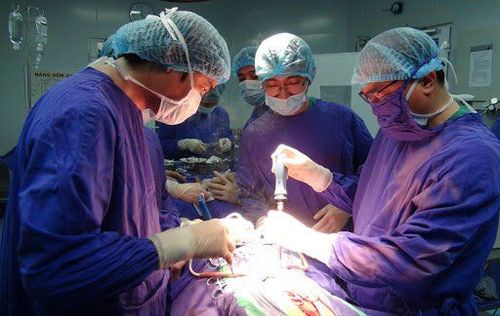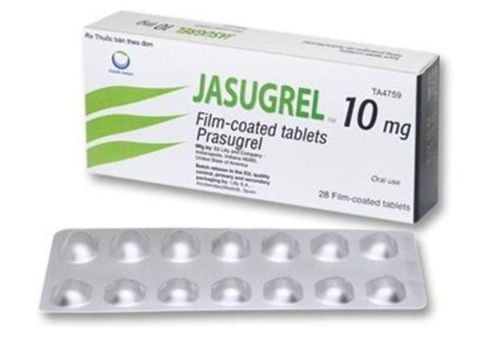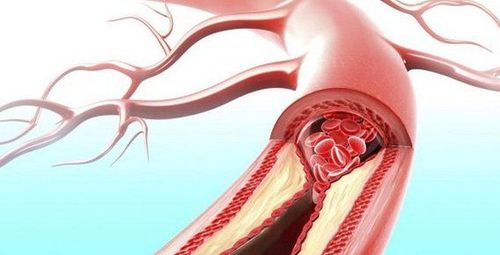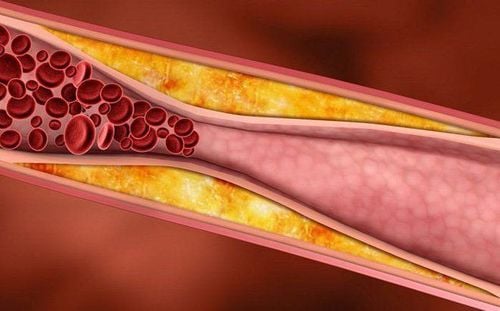This is an automatically translated article.
The article was professionally consulted by Dr. Nguyen Van Duong - Interventional Cardiologist - Cardiovascular Center - Vinmec Central Park International General Hospital.Percutaneous valve replacement without surgery is one of the most complicated heart valve replacement techniques in the world, helping patients' health to be significantly improved, especially the ability to recover quickly. Vinmec is the first hospital in Vietnam to perform this technique independently. Please refer to the non-surgical percutaneous valve replacement at Vinmec to better understand this method.
1. What is transcatheter aortic valve replacement (TAVI)?
Percutaneous aortic valve replacement is currently an alternative to aortic valve replacement surgery in patients with aortic stenosis and at very high surgical risk or no longer indicated for surgery. The valve is attached to a device that is threaded through the skin into the ascending femoral artery and attached to the aortic valve.Percutaneous aortic valve replacement was first used in patients with tight aortic stenosis who were refused surgery by surgeons due to the high risk of surgery in 2002 and was performed by Dr. Interventional cardiologist Dr. Alain Cribier. Officially and regularly applied for about 10 years now. Currently, Vinmec is the first hospital in Vietnam to perform this technique independently.
2. Designated object
This method only applies to patients:Patients over 60 years old with severe aortic stenosis (valvular area < 1 cm2, mean transvalvular pressure gradient > 40 mmHg). Have aortic and peripheral artery anatomy appropriate to the technique. Have a desire to perform TAVI. Approved by the cardiology team (heart team including internal cardiologist, cardiothoracic surgeon, interventional cardiologist, anesthesiologist) approved.

3. Implementation process
This method is done through the following steps:Step 1: The patient will be performed laboratory tests (echocardiogram, CT scan as well as other blood tests) to assess the compatibility of the heart valve structure. and vascular anatomy. Coronary angiography and aortic arch, access artery assesses the extent of damage to the coronary system, the degree of calcification of the aortic valve as well as the vascular access route.
Step 2: Consult through the cardiology team to get consensus and appropriate appointment for the patient. Explain to patients and relatives the indications, costs, possible complications before, during and after the procedure.
Step 3: Do the trick.
Outstanding advantages
Percutaneous aortic valve replacement is one of the most modern and complex heart valve replacement techniques in the world. With this technique, doctors will thread a tube through the skin from the femoral artery to the aorta to replace the heart valve, which increases the likelihood of success, reduces the risk of bleeding, and avoids many dangerous complications. This method is less invasive, gentler and simpler than conventional aortic valve replacement surgery. Doctors do not have to drive along the patient's sternum, do not have to run an artificial cardiopulmonary bypass machine, do not have general anesthesia, so the risk of complications is minimized. The recovery time of patients is also faster, only 2-6 days compared to 1-2 weeks if open surgery. This is considered a lifeline for patients who cannot tolerate surgery because of old age, weakness or chronic medical conditions.
4. Why should this technique be done at Vinmec?
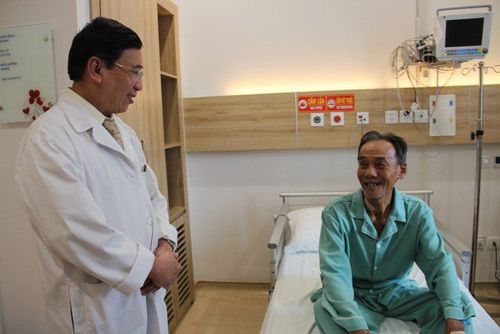
Cardiology team working in unity and mutual support, doctors Nguyen Van Phong, Doctor Le Duc Hiep who participated in performing the surgery were all trained directly by foreign experts.
Being the only place in Vietnam awarded the certificate of "Independent aortic valve replacement center in Vietnam" and GS. Vo Thanh Nhan is the first interventional cardiologist to be awarded the "Proctor" certificate in Vietnam. Vinmec's further goal is to become an excellent interventional cardiology center according to US standards, integrating with the world's level of cardiovascular intervention.
Please dial HOTLINE for more information or register for an appointment HERE. Download MyVinmec app to make appointments faster and to manage your bookings easily.






